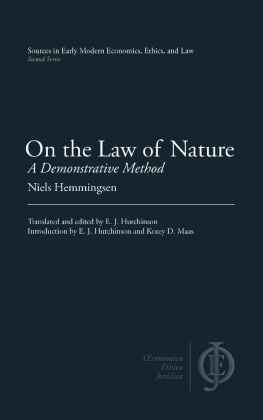First published in Great Britain in 2016 by
Policy Press University of Bristol 1-9 Old Park Hill Bristol BS2 8BB UK Tel +44 (0)117 954 5940 e-mail pp-info@bristol.ac.uk www.policypress.co.uk
North American office: Policy Press c/o The University of Chicago Press 1427 East 60th Street Chicago, IL 60637, USA t: +1 773 702 7700 f: +1 773-702-9756 e:
Policy Press 2016
British Library Cataloguing in Publication Data
A catalogue record for this book is available from the British Library.
Library of Congress Cataloging-in-Publication Data
A catalog record for this book has been requested.
ISBN 978 1 44732 866 7 paperback
ISBN 978 1 44732 868-1 ePub
ISBN 978 1 44732 869 8 Mobi
The right of Niels kerstrm Andersen and Justine Grnbk Pors to be identified as authors of this work has been asserted by them in accordance with the Copyright, Designs and Patents Act 1988.
All rights reserved: no part of this publication may be reproduced, stored in a retrieval system, or transmitted in any form or by any means, electronic, mechanical, photocopying, recording, or otherwise without the prior permission of Policy Press.
The statements and opinions contained within this publication are solely those of the authors and not of the University of Bristol or Policy Press. The University of Bristol and Policy Press disclaim responsibility for any injury to persons or property resulting from any material published in this publication.
Every effort has been made to trace copyright holders and to obtain their permission for the use of copyright material. The publisher apologises for any errors or omissions in the above list and would be grateful if notified of any corrections that should be incorporated in future reprints or editions of this book.
Policy Press works to counter discrimination on grounds of gender, race, disability, age and sexuality.
Cover design by Hayes Design
Front cover: image kindly supplied by www.alamy.com
Readers Guide
This book has been optimised for PDA.
Tables may have been presented to accommodate this devices limitations.
Image presentation is limited by this devices limitations.
This book is about public organisations and welfare institutions, and the transformation of their conditions of management. Over time, rather tricky managerial conditions have been created by the growing complexity of management, and the reaction to this growing complexity. This has led to many paradoxical questions facing managers and welfare professionals, such as, How to manage by saying Do as I tell you to. Be autonomous!, How to make changes for an unknown future, How to encourage institutions to think out of the box and constantly reinvent themselves, How to manage an institution that has to connect many functions and professional perspectives while remaining fully flexible, How to get citizens to recognise themselves as active, responsible, fellow citizens?, and How to create employees who are creating themselves in the image of the organisation.
In this book, we trace and discuss the making of these conditions for managing public organisations and welfare institutions. In particular, we pay attention to the growing tension between a desire to govern and a desire to produce change and new possibilities.
The books subtitle The orchestration of potentiality marks a tension that we perceive as fundamental to contemporary welfare management. On the one hand, welfare management is about governance, or more precisely, about the effort to create connections and consistency among the various and diverse activities of the welfare state. On the other hand, there is an immense focus on adaptability, change and innovation. We are told that without radical change, the very existence of our welfare society will be threatened.
This story affects not only the way we organise welfare, but also our core definitions of what welfare is. It has become imperative for our welfare functions to be in a continual state of reconceptualisation. Thus, a new responsibility of public managers is to seek out new conceptions of education, care, health and so on, beyond what we are able to imagine in the present. For lack of better words, we refer to this as potentialisation, that is, the creation of possibilities for renewal beyond our present conceptions. Governance therefore indicates the desire for consistency with respect to financial policies, quality and cross-departmental coordination. And potentialisation marks a seemingly opposite desire to open up, transgress what is perceived as traditional and given, and to think outside of the box. Welfare management has to manoeuvre in this contradictory terrain.
This book has been written to bridge the areas of public administration, state theory, organisation theory and social theory. What bridges these perspectives is a historical diagnostic of the present. The concept of public management has always suffered from its exclusion of questions of state and society. Public management has been perceived of as practical, neutral, technocratic and apolitical. So a central aim of this book is to reintroduce the political and societal to the field of management.
This book is a textbook for public policy, public management and leadership, public administration and management of welfare institutions such as schools, healthcare institutions, hospitals and so on. It is written primarily for postgraduate students and also for executive students such as those studying for a Masters of Public Administration (MPA). We write for the reflective manager who already knows quite a bit about management and who has experienced a need for a language with a slightly different angle on their management insights. The book is therefore written for welfare managers and students seeking insight into the insight they already possess.
We try to cover many policy fields, presenting cases from healthcare, education, social care, foreign aid, radicalisation, personal policy and so on. These cases reflect many levels of the public sector such as national ministries, local municipalities, single organisations as well as interactions between employees and citizens.
We would like to emphasise that we have not written a textbook that can be taught in isolation. Although the book has a wide scope in the sense that it seeks to combine many different facets (society, organisation and the individual), and although it contains examples from a variety of sectors and investigates the historical evolution of conditions of management, it remains vetted to a particular systems theoretical and contemporary diagnostic perspective as a means to achieve this broadness of scope we have chosen a broad empirical perspective over a broad theoretical survey.
We are both from Copenhagen Business School in Denmark, and have been teaching public management for many years. We often give presentations for experienced managers at all levels, from chief executive civil servants in ministries, to managers in local municipalities to managers of public schools, daycare institutions, health institutions, social work administrations and so on. Our research also covers this span. Although our empirical examples come from Danish welfare society, the transformations of the conditions of management we describe are similar to major trends in other European countries. However, rather than downplaying the specificities that characterise the Danish cases, we have tried to turn these into a pedagogical advantage. On the one hand, the Danish case represents an extreme case in European public welfare. But on the other, very little is actually invented in Denmark Danish policy-makers often get their inspiration for new steering technologies from other European countries, and in particular, the UK. As we see it, however, Denmark is an interesting case because new ideas are often quite radically implemented in Denmark. Ten years ago, concepts such as relational coordination and interprofessionality emerged in international discussions. Such concepts are now being implemented in Denmark in almost all policy sectors, and from the top to the bottom of public sector hierarchies. This means that the effects have become very visible.













